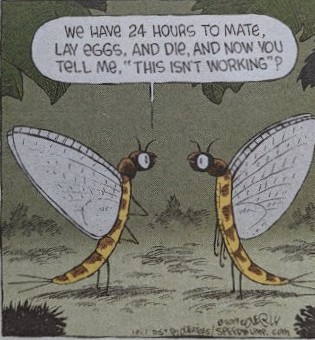October 1, 2019 – It seems as I get older time is speeding up. I give some credence to this observation when I think about what a year is to a newborn baby versus what a year is to me at age 70. So in a sense time for me is compressing because the seconds and minutes in my life compared to those of a baby represent an almost infinitesimally small amount of my lifetime. Not so for the baby.
When I saw this Speed Bump comic in today’s paper, I was reminded at just how relative time can be. For the mayfly, a day is a lifetime.
I thought further about this and it made me realize that perspectives on climate change are time-relative. For the mayfly who lives one day, climate change is largely meaningless. Life goes by in a flash.
For me at 70 with probably another 25 to 30 years at best, before I pass, climate change impacts in 2050 may be perceived as too far in the future for me to worry in the declining years of my life.
For someone Greta Thunberg’s age, 16 now, and by 2050 triple that, it means for the majority of her existence climate change will very much be front and centre making her life, and those her age and younger, far less comfortable than the one I will have experienced.
Does this time-relationship explain why our adult world has been so slow to respond to the climate crisis? Is it because we have already lived a fair amount of life that we don’t think about the fraction remaining in the same terms as the young?
In a recent article appearing in the Washington Post, it describes the results of a poll of 2,293 adults age 18 and over, and 629 teenagers between the ages of 13 and 17.
When asked “Do you think human activity is or is not causing changes to the world’s climate, including an increase in average temperature?” 86% of teens versus 79% of adults said yes.
When the teens were asked about the Green New Deal, the initiative first raised by some progressive U.S. Democrats in the House of Representatives, 57% saw the plan as realistic. And 73% of teens felt that climate change would hurt people in their generation, and 84% of people in future generations.
The teens also reported that 41% had taken action in the last two years to reduce their carbon footprint mostly through recycling and reuse efforts, less driving, more public transit, more cycling, and using less electricity in their home and personal life.
The teens in this poll were split 50/50 between describing themselves as liberal or conservative.
When Greta Thunberg proclaimed at the United Nations last week “You are stealing my future,” in relative terms the vast majority of her life lies ahead of her. So you can’t argue with her rhetoric. Watching the world you are growing up in begin to fall apart knowing that the adults in the room have the means to do something about it, has to be unnerving and frightening.
You don’t yet have the vote to shake those who represent you in government out of their lethargy. So it’s no wonder that 57% when asked about climate change describe what they are feeling as fear, while 52% are angry, and 43% feel helpless.
The mayfly in the above comic opines “we have 24 hours to mate, lay eggs, and die, and now you tell me ‘this isn’t working” strikes me as something a young person might say to an adult about climate change.
And speaking of laying eggs, in Canada, almost 5,000 young people have signed a pledge to not have children in the future until the government takes the necessary steps to fight the climate crisis. Dubbed No Future, No Children, the pledge’s founder, Emma Lim, an 18-year old studying at McGill University in Montreal, writes, “I am giving up my chance of having a family because I will only have children if I know I can keep them safe.” Right now she only sees insecurity in a future impacted by climate change.
Lim’s mother, Catherine Cartman, when asked by the CBC if she approves of her daughter’s initiative, stated, “who can blame her for not having children. It would be selfish on my part to encourage her to have children under those circumstances.”








